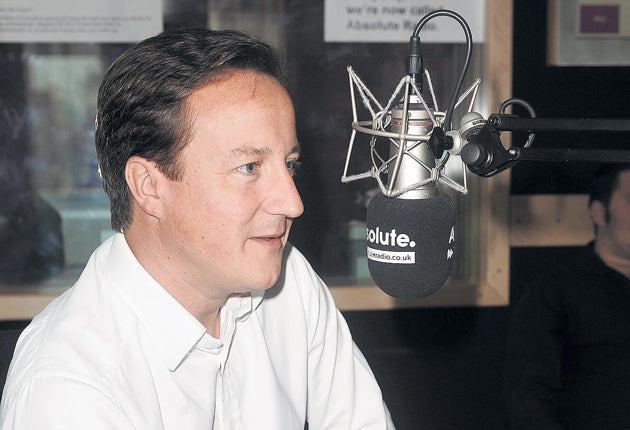Cameron the blue leader

Perhaps David Cameron was getting into the holiday spirit a little early as he embarked on a "different type of radio interview".
Or perhaps he was trying too hard to prove his hip credentials when he attempted to spread the Conservative message to Absolute Radio's youth audience.
But his appearance backfired badly as the normally urbane Tory leader swore not once, but twice, in a matter of minutes.
First he blurted out the word "twat" as he explained why he did not use the Twitter social networking service. Moments later he used the milder term "pissed off" to describe the public mood with politicians.
Mr Cameron turned the air blue in an unintended way when he was he questioned by presenter Christian O'Connell about his personality and lifestyle.
Getting into the spirit of the deliberately unconventional interview, he attempted a vulgar pun when he was asked whether he was a convert to the Twitter website.
He answered that he was not, explaining: "The trouble with Twitter, the instantness of it. Too many twits might make a twat."
As laughter erupted in the studio, O'Connell enthused: "Brilliantly put, I think that's fantastic."
The Tory leader lapsed again as he discussed the impact of the expenses scandal on the reputation of MPs. He remarked: "The public are rightly, I think, pissed off - sorry I can't say that in the morning - angry with politicians."
Aides stressed that he had instantly said sorry for using the phrase "pissed off". Although they claimed "twat" was not classified as a swear word under broadcasting guidelines, they also apologised fully for its use.
One said: "He does not condone swearing and did not go on the programme with the intention of doing it."
Playing down the row later, Mr Cameron said: "You always have to be careful what you say. If I've caused any offence I obviously regret that. I was doing a radio interview and I'm sure that people will understand that."
But O'Connell disclosed that Gabby Bertin, the Tory leader's press secretary, had been less relaxed about the salty language used by her boss.
O'Connell said: "She leapt out of her skin after the first part of the interview … when there had been some language.
"He said: 'That seemed to go OK.' She said: ‘Yeah, apart from the language.'
"He said: 'Oh, yeah, ‘pissed', sorry about that, I'm really sorry.' … She said: ‘No, it was the ‘twat'.
"He said: ‘That's not a swear word.' I think he must be posh, where a lot of them don't think ‘twat' is a swear word. His press secretary went: ‘It is'."
The presenter joked that radio regulators did not take too dim a view of the word, explaining: "In terms of the fines we can get, it is not one of the big ones."
But Tony Thorne, a language consultant to Kings College, London, said the word was "genuinely provocative and earthy word" which could "get you a punch in the mouth" if used in public.
He said: "Swearing can be used by the middle class to make them appear more progressive and more authentic.
"I suspect David Cameron was trying to be edgy and gritty. But he misjudged it – there is still a big silent majority for whom this sort of language is offensive."
Mr Thorne said: "Language is a very emotive subject in Britain – people complain much more about bad language on television than sex or violence. There's still this weird verbal Puritanism about language. We constantly eff and blind, but we're also sensitive to it."
The word "twat" is among the oldest insults in the language. Thought to derive from the Old Norse for cut or forest clearing, it is widely used as a vulgar synonym for vagina.
Last year the use of word in the novel My Sister Jodie landed children's author Jacqueline Wilson in controversy.
Complaints from parents persuaded its publisher to replace the offending term with "twit".
Random House apologised for any offence caused and would remove it from future editions of the book. But it added that it felt the word was acceptable for children aged ten and over to read "especially as it is commonly used in a way that is removed from its original meaning".
Subscribe to Independent Premium to bookmark this article
Want to bookmark your favourite articles and stories to read or reference later? Start your Independent Premium subscription today.

Join our commenting forum
Join thought-provoking conversations, follow other Independent readers and see their replies